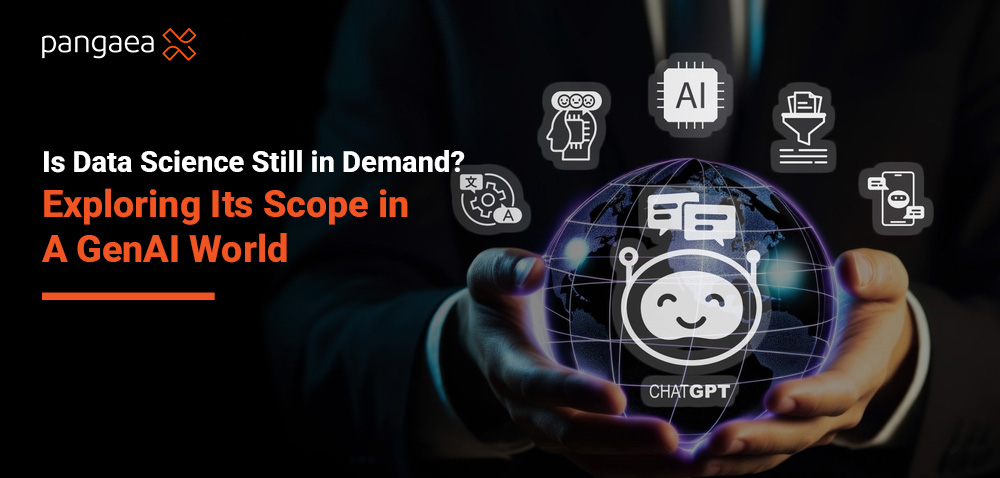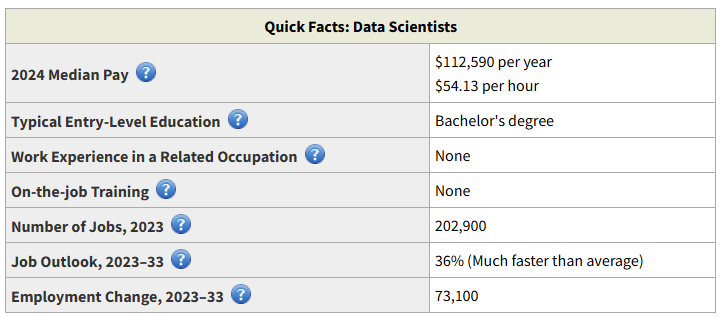Is Data Science Still in Demand? Exploring Its Scope in a GenAI World

Table of Content –
- Introduction
- The Current State of Data Science Demand
- How Is Generative AI Changing Data Science Roles?
- What New Roles Are Emerging in Data Science with GenAI?
- Which Core Skills Are Essential for Data Scientists in 2025?
- How Is Freelancing Shaping the Future of Data Science?
- What Are Global Trends & Projections in Data Science?
- What Makes a Data Science Career Stable and High-Paying in 2025?
- Conclusion
- FAQs
Introduction
As Generative AI (GenAI) continues to reshape the global technology landscape, professionals and policymakers alike are questioning the future of adjacent fields. One of the most debated: Is data science still in demand in the GenAI era? While AI applications have surged across industries, the foundations that power them clean data, sound algorithms, and human interpretation remain rooted in data science. This blog examines global trends, role evolution, skill requirements, and freelance opportunities that define data science’s enduring value, from San Francisco to Singapore.
The Current State of Data Science Demand
Data science remains one of the fastest-growing global tech careers in 2025.
Despite market fluctuations, demand for data professionals continues to rise across regions. The U.S. Bureau of Labor Statistics (BLS) projects a 36% job growth rate for data scientists from 2023 to 2033 well above the national average for all roles. Globally, LinkedIn’s job analytics shows a sustained increase in data-focused job postings across North America, Europe, Southeast Asia, and the Middle East.

Source – U.S. Bureau of Labor Statistics
This growth is fueled by the explosion of data across sectors. In 2025, the global data science and analytics market reached $178.5 billion, driven by expanding applications in finance, healthcare, manufacturing, retail, and logistics.
Importantly, employers are broadening their hiring focus. Beyond traditional data scientists, companies now actively seek data engineers, business analysts, analytics translators, and MLOps (Machine Learning Operations) specialists—roles essential for turning data into deployable, scalable business tools.
How Is Generative AI Changing Data Science Roles?
GenAI enhances data science by automating tasks not replacing expertise.
Generative AI (GenAI) technologies such as large language models (LLMs) like GPT or Claude can generate summaries, draft code, or suggest visualizations. But they still depend on structured, high-quality input data, which only data professionals can prepare effectively.
Rather than reducing the need for human analysts, GenAI shifts their focus. Tasks like feature engineering, statistical modeling, anomaly detection, and domain-specific insight still require human judgment, contextual understanding, and critical thinking. These remain core to decision-making in regulated sectors like healthcare, finance, and public policy—where automation cannot yet guarantee trust or accuracy.
GenAI also introduces new responsibilities. Data teams are now tasked with synthetic data validation, managing AI audit trails, and performing bias checks on LLM outputs. These needs create new specialties within data science, including roles in prompt engineering and AI governance.
What New Roles Are Emerging in Data Science with GenAI?
Data science roles are evolving to include AI integration, governance, and automation.
As GenAI technologies become embedded in analytics workflows, data science professionals are adapting taking on hybrid roles that blend traditional data skills with AI fluency, governance expertise, and automation oversight.
Here are five globally emerging job titles reshaping the field:
- AI-Augmented Data Scientist
Enhances traditional analytics by using GenAI for faster data preparation, code generation, and communication of insights.
- Prompt Engineer for Data Systems
Crafts effective prompts to interface with large language models (LLMs), enabling automated querying, analysis, and insight generation.
- MLOps/DataOps Specialist
Builds infrastructure for deploying, scaling, and monitoring machine learning systems—including those powered by GenAI models.
- Synthetic Data Analyst
Designs and validates artificially generated datasets used to train AI models while preserving privacy or scaling rare data scenarios.
- Data Governance & Ethics Analyst
Oversees data integrity, algorithmic fairness, and regulatory compliance—especially in AI-assisted environments subject to global policy scrutiny.
These roles highlight how data science is no longer just technical—it’s strategic, ethical, and increasingly interwoven with global AI capabilities.
Which Core Skills Are Essential for Data Scientists in 2025?
Fundamental data science skills remain crucial, even in a GenAI-enhanced world.
While GenAI introduces new tools, the global job market continues to prioritize foundational competencies. These skills form the backbone of reliable analysis, model building, and data communication—regardless of geography or industry.
Here are the most in-demand data science skills worldwide:
- Statistical Modeling
Mastery of distributions, regressions, confidence intervals, and hypothesis testing for inference and prediction.
- Machine Learning (ML)
Implementation of supervised and unsupervised models, deep learning architectures, and ensemble methods like Random Forests and XGBoost.
- Data Wrangling
Efficient use of Python, R, and SQL for cleaning, transforming, and validating datasets—critical for all stages of analysis.
- Visualization & Reporting
Skilled use of Tableau, Power BI, matplotlib, and Seaborn to present data insights to technical and non-technical stakeholders.
- Cloud Computing & MLOps
Proficiency in AWS, GCP, Azure; experience with CI/CD pipelines, Docker, and Kubernetes to deploy and manage data products at scale.
- Communication & Storytelling
Ability to translate technical findings into strategic insights, aligning results with business goals.
Emerging additions to this toolkit include prompt engineering, GenAI API integration, and ethical AI auditing—skills increasingly expected as LLMs and automation tools augment traditional workflows.
The World Economic Forum projects that by 2030, analytical thinking, AI/Big Data literacy, and systems analysis will rank among the top-five most essential job skills Data science inherently combines all three.
How Is Freelancing Shaping the Future of Data Science?
Freelance data science is now a global, flexible, and fast-growing career path.
What was once a corporate-exclusive role is now a thriving freelance economy. Platforms like Upwork, Toptal, and Pangaea X report increasing demand for data professionals who can deliver results remotely and independently.
High-demand freelance offerings include:
- Exploratory Data Analysis (EDA)
Conducting initial data investigations to uncover trends, outliers, and patterns.
- Dashboard and Report Creation
Building interactive visual tools using Power BI, Tableau, or Streamlit for real-time business insights.
- Custom Machine Learning Models
Designing tailored predictive systems for client-specific data problems.
- GenAI-Integrated BI Solutions
Embedding large language models (LLMs) into reporting tools for natural language insights and automation.
Freelancers with specialized skills—such as time-series forecasting for financial clients or LLM output evaluation for AI product teams—are especially in demand. These professionals thrive by managing multiple clients across time zones and industries, offering both flexibility and exposure to cutting-edge projects.
Global accessibility, combined with rising demand for data-backed decision-making, makes freelancing a viable and rewarding path for data scientists in 2025 and beyond.
What Are Global Trends & Projections in Data Science?
Data science demand is surging worldwide backed by investments and forecasts.
The European Union’s €200 billion InvestAI initiative is funding AI and data infrastructure projects, including four AI “gigafactories” equipped with over 100,000 high-performance chips each. Meanwhile, the United States continues to lead private sector investment, spending more than $109 billion in 2024 on AI and data systems.
Singapore, the UAE, and other rapidly developing economies are scaling sovereign cloud platforms and data centers to position themselves as global data hubs.
The World Economic Forum (WEF) forecasts that by 2030, analytical thinking, AI and big data expertise, and system-level decision-making will rank among the top five job skills globally. These capabilities are at the heart of modern data science.
Further, data generation is accelerating. IDC predicts the digital universe will reach 175 zettabytes by 2025, increasing demand for data interpretation and governance across sectors like finance, supply chain, healthcare, and climate science.
What Makes a Data Science Career Stable and High-Paying in 2025?
Data science offers secure growth, strong pay, and clear career paths.
According to the BLS, median salary for U.S. data scientists was $112,590 as of May 2024. Top-tier professionals earn $150,000 to $200,000+, especially in finance, consulting, and tech-heavy regions like San Francisco, London, and Berlin. Forecasts suggest that by the end of 2025, median salaries could exceed $120,000.
Research.com notes that entry-level salaries range between $80,000–$110,000 depending on location, while mid- to senior-level professionals often command $130,000–$170,000 across North America, Europe, and APAC regions. In the UK, average compensation is around £67,000, rising above £75,000 in London. In Germany, data scientists earn approximately €78,000, and in Switzerland, salaries average $143,000. Markets in Australia, Singapore, and the UAE continue to show rising pay trends, driven by increased demand.
Career Progression Path:
- Entry-level: Data Analyst → Junior Data Scientist
- Mid-career: Machine Learning Engineer → Data Product Owner
- Senior: Chief Data Officer, AI Strategy Lead, Data Science Consultant
Moreover, professionals can pivot into management, consulting, academia, or niche specialties like bioinformatics, legal tech, fintech analytics, and environmental modeling. This flexibility makes data science one of the most resilient and adaptable tech career paths globally.
Conclusion
The global demand for data science is rising—not falling—in the GenAI era. Far from being made obsolete, data science is evolving to meet new challenges in AI oversight, automation, and ethical governance. Across industries and continents, companies are investing in the talent and infrastructure needed to harness data’s potential.
Whether you’re a seasoned professional or an aspiring data scientist, the message is clear: this is a resilient, well-compensated, and future-facing career. From full-time enterprise roles to remote freelance projects, opportunities abound.
As the AI & Data Talent Ecosystem, Pangaea X enables data professionals to hire, verify, connect, and compete unlocking high-impact freelance opportunities worldwide. Whether you’re building models, visualizing insights, or integrating GenAI into enterprise systems, your future in data starts here.
FAQs
Q1: Will data science become obsolete due to GenAI?
No. While GenAI automates some tasks, critical thinking, domain expertise, and data governance still require human insight.
Q2: What industries are hiring the most data scientists in 2025?
Finance, healthcare, retail, manufacturing, and SaaS are leading sectors, with growing demand in climate and ethics-focused roles.
Q3: Is it worth pursuing a career in data science in 2025?
Absolutely. With strong job growth, competitive salaries, and diverse career paths, data science remains one of the most future-proof careers.
Q4: What’s the best way to enter the freelance data science market?
Build a strong portfolio, specialize in a niche, and join trusted platforms like Pangaea X that connect clients with vetted data experts.
Q5: How is data science different from AI?
Data science focuses on extracting insights from data using statistical and analytical methods. AI builds systems that simulate intelligence. They intersect but are distinct disciplines.